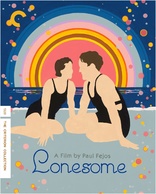Lonesome Blu-ray Movie
HomeLonesome Blu-ray Movie 
Criterion | 1928 | 3 Movies | 70 min | Not rated | Aug 28, 2012Movie rating
7.6 | / 10 |
Blu-ray rating
| Users | 0.0 | |
| Reviewer | 4.5 | |
| Overall | 4.5 |
Overview
Lonesome (1928)
Two city workers meet and fall in love on Coney Island.
| Drama | 100% |
| Romance | 38% |
| Comedy | Insignificant |
Specifications
Video
Video codec: MPEG-4 AVC
Video resolution: 1080p
Aspect ratio: 1.19:1
Original aspect ratio: 1.2:1
Audio
English: LPCM Mono (48kHz, 24-bit)
Subtitles
English SDH
Discs
50GB Blu-ray Disc
Single disc (1 BD)
Playback
Region A (locked)
Review
Rating summary
| Movie | 4.5 | |
| Video | 4.5 | |
| Audio | 4.0 | |
| Extras | 5.0 | |
| Overall | 4.5 |
Lonesome Blu-ray Movie Review
Reviewed by Dr. Svet Atanasov October 7, 2012Paul Fejos's "Lonesome" (1928) arrives on Blu-ray courtesy of Criterion. The supplemental features on the disc include a new audio commentary by professor Richard Koszarski; new reconstruction of Paul Fejos' "Broadway" (1929); Danish version of Paul Fejos' "The Last Performance" (1929); and an excerpt from an archival interview with Academy Award winning cinematographer Hal Mohr. The release also arrives with an illustrated booklet featuring essays by Phillip Lopate and Graham Petrie, and an excerpt from an interview with Paul Fejos conducted by John T. Mason Jr. for Columbia University's Oral History Research Program. Region-A "locked".
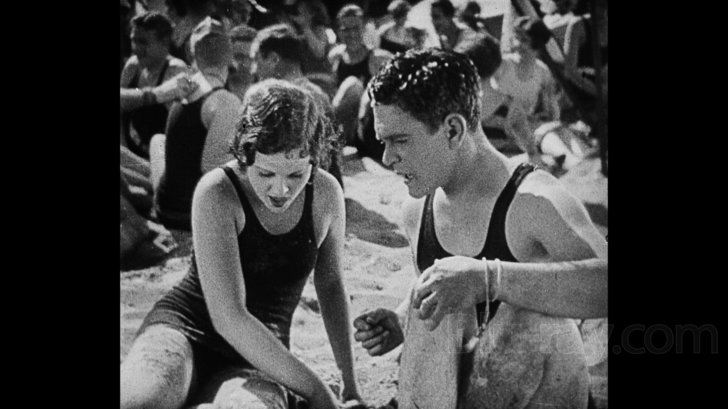
I lost my ring...
The beauty of this little seen film from the late Ď20s is in its simplicity. No, I donít mean that the visuals are too basic. What I mean is that it tells a love story with directness that immediately touches the heart. It almost seems strange that such an honest film was made such a long time ago, when directors were just starting to experiment with sound. It seems too modern of a film.
The two protagonists in Hungarian director Paul Fejosí Lonesome, Mary (Barbara Kent, Flesh and the Devil, Vanity Fair) and Jim (Glenn Tryon, Broadway, The Sky Spider), live in New York City, and like most young people today do not have time to socialize. Mary is a phone operator, while Jim works in a large factory. They commute daily and the little free time they have they use to see friends.
On Fourth of July, all couples go out to celebrate. Because they have no one to go out with, Mary and Jim go home. But when the noise from the street reaches their building, they decide to go to Coney Island and join the festivities. The place is packed with people and there is barely enough room to move.
Somehow Mary and Jim find each other and begin celebrating. They have fun in the amusement park and later on dance. At this point they look at each other in a way that lovers look at each other. There is no need to put into words how they feel, and they know it.
What they donít know is their names. They are so enthusiastic and so happy to be together that they never thought about asking what the otherís name is. What matters to them today is that they have found each other. Going forward they will have plenty of time to learn their names and talk about their lives. Right now they are just like everyone else - happy to love and happy to be loved.
But before the night is over, a serious event separates the lovers.
Fejosí Lonesome was completed and screened in 1928. Financially, it was a big success for Universal Studios, its producers. It was also a tremendous hit amongst casual filmgoers and critics. In fact, some critics were so impressed with it that they rushed to compare it to the works of F.W. Murnau and King Vidor.
However, the truth is that it is virtually impossible to compare Lonesome to anything Murnau and King directed. Lonesome feels and looks very modern; it constantly tiptoes the fine line that separates documentary and art. It offers a fascinating glimpse at a bustling metropolis where alienation is a very real issue (just as it is today), while at the same time it dazzles with splashes of color and surprises with a few lines of dialog. This type of poetic realism really is virtually impossible to detect in any of the big silent films from the same era.
Perhaps the most unusual aspect of this film, however, is the visual composition. The footage from the city and later on Coney Island (some of which was actually shot in Venice and Long Beach, California) and the romantic (color) sequences simply flow. At no point it feels like something was done to impress (this also goes for the Jack Rabbit Racer footage, which was shot with special cameras at night) and everything looks quite real. For a silent film from the late '20s, this is indeed an enormous accomplishment.
Note: In 2010, Paul Fejosí Lonesome was inducted into the National Film Registry.
Lonesome Blu-ray Movie, Video Quality 
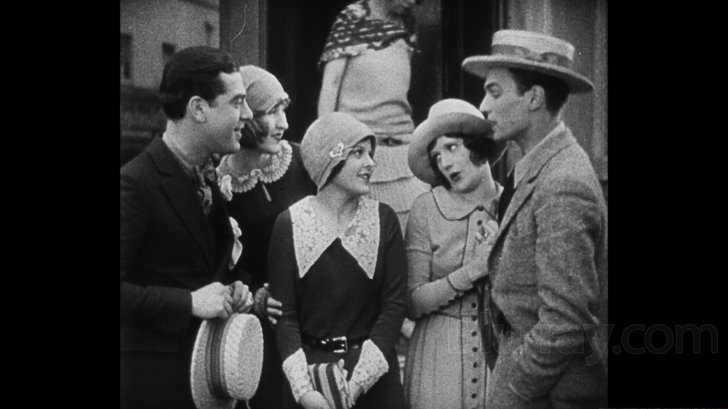
Presented in an aspect ratio of 1.19:1, encoded with MPEG-4 AVC and granted a 1080p transfer, Paul Fejos' Lonesome arrives on Blu-ray courtesy of Criterion.
The following text appears inside the booklet provided with this Blu-ray disc:
"This new digital transfer was created in 2K resolution on a Spirit 4K Datacine from 35mm restoration black-and-white and color duplicate negatives, which were assembled digitally. Thousands of instances of dirt, debris, scratches, splices, warps, jitter and flicker were manually removed using MTI's DRS and Pixel Farm's PFClean, while Image System's Phoenix was used for small dirt, grain, and noise reduction.
Telecine supervisor: Lee Kline.
Colorist: Jerome Theila/Criterion Post, New York.
Scanning: Eastman Kodak."
The following text appears before the film's opening credits:
"The original material for this restoration of Lonesome is a nitrate print donated by the Cinemathique Francaise. Intertitles for that print were in French. No script is known to exist for this film. Except for one title, all have been translated from the French intertitles in the nitrate print."
Considering the fact that the restorers had to work with a very old and obviously badly damaged print, the final result is quite strong. Various scratches and tiny marks remain, but detail and especially clarity are indeed surprisingly good. A lot of the carnival footage, in particular, appears to be quite healthy. Color grading is also very pleasing. The painted footage also boasts good color saturation. There are no serious stability issues, though obviously some frame transitions are more convincing than others. The important thing to clarify here is that there are no "jumping" frames. Finally, there are no traces of post-production attempts to gloss the film. All in all, this is an enormously satisfying presentation of a film that is now essentially preserved for future generations to see. (Note: This is a Region-A "locked" Blu-ray disc. Therefore, you must have a native Region-A or Region-Free PS3 or SA in order to access its content).
Lonesome Blu-ray Movie, Audio Quality 
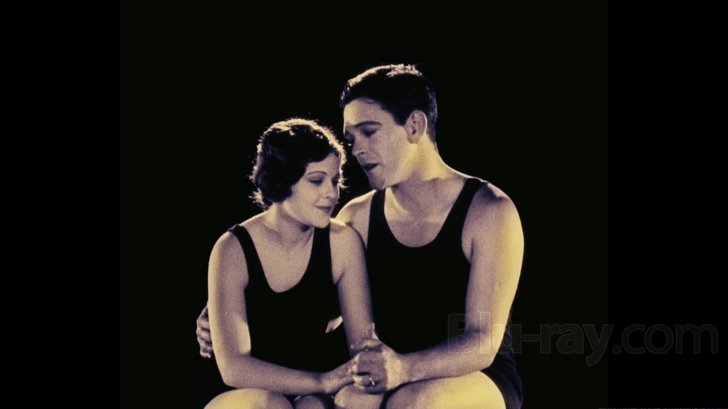
There is only one standard audio track on this Blu-ray disc: English LPCM 1.0. For the record, the film comes with English intertitles, which have been translated from the original French intertitles from the French print used for the restoration.
In the booklet provided with this Blu-ray disc there is a long text by Dan Wagner, Head of Preservation at George Eastman House, in which he explains in detail the type of work that went into the restoration of Lonesome. The text also addresses the various efforts that went into restoring the audio effects and bits of dialog in the film.
I have to assume that what is on this disc is essentially what current technology can accomplish in terms of audio restoration and stabilization. The sound effects and the dialog are indeed surprisingly good, while the parade at Coney Island with all of its chaos and extra noise is as effective as it could be. Early into the film there are a few minor distortions, but overall the basics for this nearly 85-year old film are indeed very solid.
Lonesome Blu-ray Movie, Special Features and Extras 
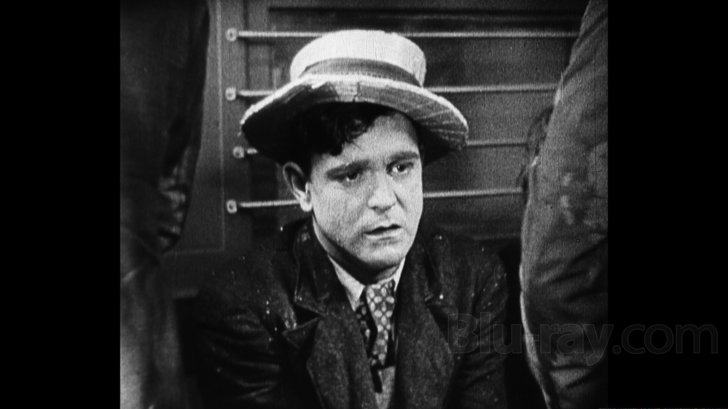
- Commentary - a very informative audio commentary by Richard Koszarski, professor of English and film studies at Rutgers University. Mr. Koszarski discusses the production history of Lonesome and its unique qualities, as well as as Paul Fejos very interesting life and career in the United States and Europe. The specific technical information during the second half of the film (where and how certain sequences were shot) is particularly interesting. The commentary was recorded exclusively for Criterion in 2012.
- Fejos Memorial - a year before his death in 1963, director Paul Fejos recorded an autobiography for Columbia University's Oral History Research Program. Offered here is a visual essay, produced by Paul Falkenberg in collaboration with Paul Fejos' widow, Lita Binns Fejos, which excerpts that recording to narrate the story of the filmmaker's life. In English, with optional English subtitles. (20 min, 1080p).
- The Last Performance - this 1929 film was initially shot as a silent but later on dialog was added before it was officially released. The part-talkie version no longer exist. Included here is the Danish version of the film, retitled De tovl klinger (The Twelve Swords), with a new score by composer Donald Sosin. With Danish intertitles and optional English subtitles. (60 min/1080p/Dolby Digital 2.0).
- Broadway - completed in 1929, Paul Fejos' Broadway is a black-and-white film about gangsters and hoofers in a New York Club, starring Glenn Tryon, Evelyn Brent, and Merna Kennedy. It was released in both silent and sound versions. Although the last reel of the sound film has been lost, presented here is a reconstructed version which incorporates the final reel of the silent version with a soundtrack element discovered in a private collection. (114 min/1080p/Dolby Digital 1.0).
- Hal Mohr on Broadway - Academy Award winning cinematographer Hal Mohr (Phantom of the Opera, A Midsummer Night's Dream) discuses the complex camera crane that was designed for the production of Broadway. The excerpt offered here is from an interview conducted by film historian Richard Koszarski in 1973. In English, not subtitled. (7 min, 1080p).
- Booklet - a 34-page illustrated booklet featuring Phillip Lopate's essay "Great City, Great Solitude", Graham Petrie's essay "The Travels of Paul Fejos", an excerpt from a 1962 interview with Paul Fejos conducted by John T. Mason Jr. for Columbia University's Oral History Research Program. Also included are notes on the restoration of Lonesome.
Lonesome Blu-ray Movie, Overall Score and Recommendation 
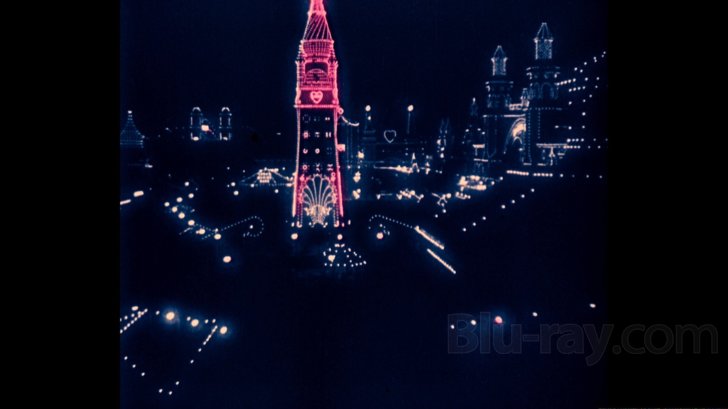
The praise is well deserved - Lonesome is indeed a fascinating early American film directed by an enormously talented director, Paul Fejos. Kudos to all parties involved with the restoration and reconstruction of the film, and kudos to Criterion for bringing to Blu-ray yet another important film that can now be seen in the best possible quality. VERY HIGHLY RECOMMENDED.
Similar titles
Similar titles you might also like

Life of Riley
Aimer, boire et chanter
2014

Zama
2017

People on Sunday
Menschen am Sonntag
1930

L' Atalante
1934

Pauline at the Beach
Pauline ŗ la plage
1983

Three Colors: White 4K
Trois couleurs: Blanc
1994

The Rules of the Game
La rŤgle du jeu
1939

Flirt
1995

Age of Consent
1969

Stray Dogs
郊游 / Jiao you
2013

The Forbidden Room
2015

City Girl
1930

Sunrise
Sunrise: A Song of Two Humans
1927

Rust and Bone
De rouille et d'os
2012

Midnight in Paris
2011

Make Way for Tomorrow
1937

Children of Paradise
Les enfants du paradis
1945

Vanya on 42nd Street
1994

La collectionneuse
The Collector
1967

The Square
2017
